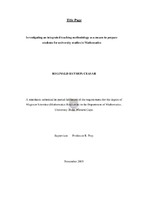Skills, training and support for carers in HIV/AIDS community home-based care: a case study of carers in Chikankata, Zambia
Abstract
The high prevalence of HIV/AIDS in Zambia has led to the development of innovative ways of coping with sickness related to this infection. HIV/AIDS home-based care is one such innovation designed in Chikankata Hospital in 1987. Home-based care depends on the availability of family members and community volunteers in the provision of care and support for People Living with HIV/AIDS (PLWHA).This minithesis is based on a qualitative descriptive case study exploring perspectives regarding skills, supervision and support mechanisms for carers in the Chikankata HIV/AIDS Community-Home Based Care (CHBC) program. The study utilized documented research, focus group discussions with carers and structured interviews with local CHBC supervisors, national experts in CHBC, and PLWHA and their families, to collect data from 32 study participants.The findings were that CHBC was being delivered by community volunteers with limited involvement from the local health services; that carers were highly motivated, personally and collectively mobilizing resources to meet the needs of CHBC clientele; that local arrangements for training, skills and support of carers were not aligned to national guidelines regarding process, content and duration of programmes; and that carers acquired skills in CHBC through formal and informal training processes and were facing challenges related to inadequate skills, poor infrastructure and extreme poverty in households caring for PLWHA.Based on the findings the local arrangements for coordination of CHBC need to be strengthened and linked to formal processes for technical support, financial resources and materials for delivery of CHBC in line with existing guidelines on CHBC. The picture of the real situation of the carers that emerges from this qualitative study might inform the supervising organizations and policymakers on the gaps in the training and support of this crucial cadre in the provision of quality care for People Living with HIV/AIDS (PLWHA) at community level.

